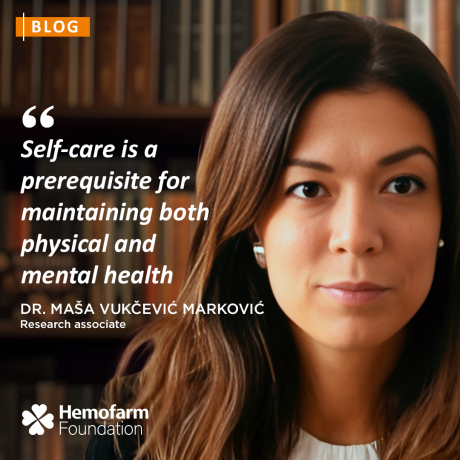
14/05/2025
Self-Care in Times of Crisis and Uncertainty
Dr. Maša Vukčević Marković
Research Associate at the Department of Psychology, Faculty of Philosophy, University of Belgrade
Self-Care in Times of Crisis and Uncertainty
"I’m disconnecting from the networks, I can’t handle this amount of information anymore, this is unsustainable, how can it be normal for me to go to work now?" These are common phrases I’ve been hearing a lot around me lately. Although we, as a society, have experience in crises, and although this latest one, despite the terrible losses, anger, despair, and grief, has (finally) brought us hope, the pressures on our psycho-physical state and mental health are huge and heavy.
Since we’ve never been in an identical situation before, it would be an overstatement to claim there’s a perfectly accurate and unambiguous answer to the question of how to take care of ourselves in this period. However, there are some guidelines.
When there are major crises, changes, and uncertainties, one thing that can help is to remind yourself of what is constant in your life. What is your point of support that has been there when worlds were collapsing, and even on those very dull days? The strongholds of stability and peace can be found in many places—whether it’s loved ones, pets, calming music, a movie you’ve been returning to since childhood, or a fragrance that reminds you of someone. We use our senses to feed the need for security, and the body knows what it needs; sometimes, it only takes a small reminder. Remind yourself that there are things in your life that have always been there, and most likely always will be. And actively make space for them. If not on a daily, then at least on a weekly basis.
Another guideline would be related to the most basic self-care. In times that are both physically and mentally challenging, we need sleep, silence, and time when we are not exposed to news or topicalities. We need water and, as much as possible, healthy and regular nutrition. I often get the impression that guidelines on this matter remain at the level of commonplaces, and it’s hard to truly convey their significance. So let me try—if you afford yourself these basic things, you’ll be mentally more stable, less affected by things, and better able to think and plan, which will be particularly important during this period.
And finally—when it’s said that many of us react differently to the same things, it’s true, especially in high-stress and uncertain situations. Some will need to go to the front lines, to stay well-informed—perhaps to reestablish their sense of control over their life and circumstances. Others will need to retreat, isolate, and remain silent—this will be necessary to heal, reorganize their experiences, and come up with a plan. And not only will the reactions differ between people, but they will also change within the same person throughout different phases of the crisis. All these reactions are expected and normal in the situation we find ourselves in, and often may represent the only form of struggle a person can engage in at a given moment. Try to remember this, especially if, during certain periods, the empathy, solidarity, and unity that we’ve finally managed to build, naturally fall into crisis and then recover.
Give others the trust and support in dealing with the current societal situation and their many internal and external struggles to the best of their abilities. And no less important, allow it to yourself too.

AUTHOR
Dr. Maša Vukčević Marković
Research Associate at the Department of Psychology, Faculty of Philosophy, University of Belgrade